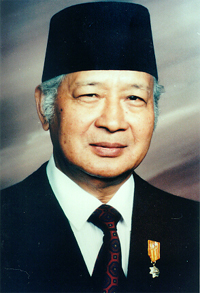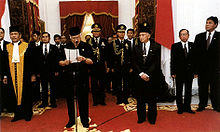Suharto
Haji Mohamed Suharto (according to the orthography Soeharto until 1972 ; born June 8, 1921 in Kemusuk near Argamulya on Java , Dutch East Indies ; † January 27, 2008 in Jakarta , Indonesia ) was the second Indonesian President and Kostrad General. He ruled the country dictatorially from 1967 to 1998 and is considered one of the initiators of the massacres in Indonesia from 1965 to 1966 .
Life and political career
Suharto was a general and headed a military coup in 1965, with which the traditionally conservative armed forces responded to previous protests by left-wing students and a failed allegedly communist coup attempt . After the de facto dismissal of the first Indonesian president since Indonesia's independence (1949), Sukarno , Suharto acted first as head of government from 1966, then as incumbent head of state from 1967. On March 27, 1968, he also officially became president and held this office as a dictator until 1998. In order to underline the turning away from the left-wing nationalist politics, the Nasakom , of his predecessor, the new ruler proclaimed the beginning of a "New Order" ( Orde Baru ).
During his tenure and in the context of the Cold War , Suharto was particularly open to economic investments by NATO countries. His close cooperation with the USA and his liberal economic policy earned the anti-communist additional prestige in the West. Suharto visited the Federal Republic of Germany twice, first in 1970 and again in July 1991.
Domestic politics
In domestic politics the general showed great cruelty and eliminated all opposition. When he came to power, according to various estimates, between 400,000 and a million communists and students critical of the government were murdered in the massacre in Indonesia from 1965 to 1966 . Simultaneously with their murder, there was also a genocide of the Indonesian Chinese . Several Islamic groups actively supported the bloody crackdown on the communists.
Suharto commented on the internment camps that were set up afterwards: "Trials are taking place all over the country, but with such a large number it takes time for everyone to get their turn."
Human rights violations
During Suharto's reign, the illegal occupation of East Timor in 1975 and the subsequent massacres there, in which more than a third of all residents were killed. In Western New Guinea , renamed Irian Jaya Province , Suharto also suffered serious human rights violations when native Papuans were murdered and displaced. At the same time, the government promoted the settlement of Muslim Indonesians in the province and the ruthless economic exploitation of the rich natural resources.
Although the pancasila principle, which has been in effect since the state was founded, officially recognizes four other faiths in addition to Islam, Suharto became increasingly less tolerant of religious issues from the 1980s onwards. Among other things, he allowed Islamic legal elements to be included in the jurisprudence at this time and dismissed non-Muslim ministers from the government, which was seen as a violation of the Pancasila principle. The legal discrimination of the Chinese minority, which had already begun under Sukarno , was massively continued in the “New Order” .
Foreign policy
Under Suharto's leadership, Indonesia maintained good contacts with the West. The USA was the most important trading partner at that time. The western press was largely benevolent towards Suharto. Even the critical New York Times described the dictator on the occasion of Richard Nixon's visit on July 27, 1969 as a humble, trustworthy person who made politics "with the help of an excellent team of economists remarkably successful". The newspaper put the politicians of the previous government who were overthrown and, for the most part, murdered, on a par with marauding “communist killing units”.
Suharto built good relationships with the Federal Republic of Germany in particular. A lifelong friendship developed with the then Federal Chancellor Helmut Kohl , who visited Indonesia four times during his tenure.
The Indonesian military benefited from Western arms deliveries during the East Timor massacre, but also afterwards.
resignation
After prolonged student protests and against the background of the Asian crisis , Suharto, who had ruled since 1967, had to resign on May 21, 1998. Before that, there was another pogrom against the Chinese minority, which is said to have been organized by Suharto's son-in-law Prabowo Subianto . Bacharuddin Jusuf Habibie, chosen by him as his successor, became the new president .
Corruption litigation
After the end of his regime, Suharto was tried for corruption . He was accused of embezzling at least $ 571 million in public funds. On September 28, 2000, the case was discontinued for health reasons.
Family and death
Suharto was married to Raden Ayu Siti Hartinah, also Siti Hartinah Suharto in a different spelling: Siti Hartinah Soeharto, known in Indonesia as "Ibu Tien / Madam Tien" (* 23 August 1923, † 28 April 1996), who are considered to be highly influential Adviser Suhartos was considered. Suharto and Siti Hartinah had six children: Siti Hardiyanti Rukmana (Tutut), Sigit Harjojudanto (Sigit), Bambang Trihatmodjo (Bambang), Siti Hediati (Titiek), Hutomo Mandala Putra (Tommy) and Siti Hutami Endang Adiningsih (Mamiek), and 11 Grandchildren and several great-grandchildren.
Suharto's daughter Siti Hediati Harijadi was married to Prabowo Subianto . His son Bambang Trihatmodjo was an investor among others. active in the hotel industry. The youngest son, Tommy Suharto (full name: Hutomo Mandala Putra), born July 15, 1962, was found guilty of inciting the murder of Supreme Court Justice Syafiuddin Kartasamita in 2002.
On January 27, 2008, Suharto died after a long illness in a hospital in the Indonesian capital Jakarta. The following day he was buried with military honors in Surakarta .
See also
literature
- Soeharto: thoughts, words and deeds. An autobiography based on descriptions given to G. Dwipayana and Ramadhan KH German translation: Thomas Zimmer, edited by Berthold Damshäuser . PT. Citra Lamtoro Gung Persada, Jakarta 1994, ISBN 979-8085-01-9
Web links
- Literature by and about Suharto in the catalog of the German National Library
Individual evidence
- ↑ See Jochen Hippler , Nasr Hamid Abu Zaid , Amr Hamzawy : War, Repression, Terrorism . ( Memento of March 26, 2010 in the Internet Archive ) (PDF; 697 kB) Political violence and civilization in Western and Muslim societies . ifa, Stuttgart 2006, p. 55 ff.
- ↑ Lutz Herden: Season of the cleaver . Friday , July 21, 2000
- ↑ We have 58,000 political prisoners . In: Der Spiegel . No. 27 , 1970 ( online ).
- ↑ See Peter L. Münch-Heubner : East Timor and the crisis of the Indonesian multi-ethnic state in world politics. Munich 2000, pp. 134-135.
- ↑ see Legislation on Chinese Indonesians in the engl. Wikipedia
- ↑ Doris K. Gamino: September 11th as a global turning point? Perceptions from Latin America, the Middle East, Russia and Indonesia: Indonesia after September 11th. Parliament 27/2011, July 4, 2011, archived from the original on December 11, 2013 ; accessed on June 8, 2017 .
- ↑ Philip Shabecoff: Shy Indonesian Leader . The New York Times , July 28, 1969.
- ↑ Indonesia: Dictator Suharto is dead. In: Spiegel Online . January 27, 2008, accessed June 8, 2017 .
- ↑ a b Volkmar Deile : Indonesia: Visiting a friend. In: AI-Journal. Amnesty International Germany, October 1996, archived from the original on July 23, 2015 ; accessed on June 8, 2017 .
-
↑ Noam Chomsky : Implacable Memory - East Timor and the West. In: Le Monde Diplomatique. chomskyarchiv.de, October 1999, archived from the original on July 10, 2012 ; Retrieved on June 8, 2017 (German by Meino Büning). Arms export: an enormous number of possibilities . In: Der Spiegel . No.
42 , 1985, pp. 17-25 ( online ). - ↑ Cf. Gunnar Heinsohn : Lexicon of Genocides. Reinbek 1998, p. 105.
- ↑ Dictator Suharto is dead . Spiegel Online , January 27, 2008
- ↑ Leading politicians pay tribute to Indonesia's ex-dictator Suharto . wsws.org, January 31, 2008
| personal data | |
|---|---|
| SURNAME | Suharto |
| ALTERNATIVE NAMES | Suharto, Haji Mohamed (full name) |
| BRIEF DESCRIPTION | Indonesian politician |
| DATE OF BIRTH | June 8, 1921 |
| PLACE OF BIRTH | Kemusu Arga in Java , Indonesia |
| DATE OF DEATH | January 27, 2008 |
| PLACE OF DEATH | Jakarta |



